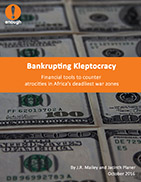Activist Brief: Violent Kleptocracies
What is a Violent Kleptocracy? Enough defines violent kleptocracy as a system of state capture in which ruling networks and commercial partners hijack governing institutions for the purpose of resource extraction and for the security of the regime. Ruling networks utilize varying levels of violence to maintain power and repress dissenting voices ...
Violent Kleptocracies: How they’re destroying parts of Africa and how they can be dismantled
Millions of people have suffered and perished in the ongoing wars in East and Central Africa, including Sudan, South Sudan, Somalia, the Democratic Republic of the Congo, Burundi, Rwanda, Uganda, and the Central African Republic. The big prize in these deadly conflicts is the control of a hijacked state and the natural resource wealth of the country ...
EU Announces Increased Pressure to Address Crisis in Congo
Today, the European Union’s Foreign Affairs Council announced support for individual sanctions to address the escalating political crisis in the Democratic Republic of Congo ...
President Obama Signs Anti-Wildlife Trafficking Legislation into Law

On October 7, 2016, H.R. 2494, the Eliminate, Neutralize, and Disrupt Wildlife Trafficking Act of 2016 was signed into law by President Obama. This law will support the protection of elephants, rhinos, and other endangered species from a from a sophisticated international poaching and trafficking trade that is decimating animal populations worldwide and funding armed groups ...
The Heat: South Sudan’s Long Road to Peace Part 2
Enough Project Associate Director of Policy Brian Adeba discusses South Sudan's humanitarian crisis on 'The Heat', which originally aired October 13, 2016 ...
U.S. has financial tools to counter atrocities in Africa’s deadliest war zones, says new report
A new report, “Bankrupting Kleptocracy: Financial Tools to Counter Atrocities in Africa’s Deadliest War Zones,” by the Enough Project, highlights three types of potent financial pressure tools that the U.S. can use to build leverage in the fight against violent kleptocracy: targeted sanctions, anti-money laundering provisions, and anti-bribery laws, including the Foreign Corrupt Practices Act. The U.S. government has used these tools to counter terrorism, nuclear proliferation, and organized crime. These tools, the authors argue, can also be used to fight violent kleptocracy in East and Central Africa ...
U.S. Tools to Bankrupt Kleptocracy: Targeted and Sophisticated Sanctions Programs
Sanctions are well-suited to countering violent kleptocracies because of their ability to impact the target regime’s wealth. Sanctions can alter kleptocrats’ problematic incentive structures, which favor continued conflict over peace due to the prospect of financial gain from war. To be most effective, however, sanctions must be strategic in both design and implementation ...
U.S. Tools to Bankrupt Kleptocracy: Anti-Money Laundering and Asset Seizure
Corruption and money laundering go hand in hand. Money laundering is the effort to legitimize wealth obtained through the commission of a crime, often known as a “predicate offense.” Fraud, theft, bribery, and other acts associated with corruption are considered to be predicate offenses in most jurisdictions. A wide range of anti-money laundering provisions have come into force over the past century that can be used to combat corruption. However, numerous loopholes that remain in place allow ill-gotten gains to enter the United States with ease and prevent efforts aimed at tracing and seizing the proceeds of corruption ...
U.S. Tools to Bankrupt Kleptocracy: The Foreign Corrupt Practices Act (FCPA)
The Foreign Corrupt Practices Act (FCPA) was passed in 1977 and prohibits U.S. persons from bribing foreign officials. The law was developed after an investigation by the U.S. Securities and Exchange Commission found that in order to secure business opportunities overseas, over 400 U.S. companies had paid hundreds of millions of dollars in bribes to foreign officials. The same investigation found that these firms were using “secret slush funds” and falsifying corporate records to disguise illicit payments to foreign officials (as well as illegal campaign contributions to U.S. politicians) ...
Bankrupting Kleptocracy: Financial tools to counter atrocities in Africa’s deadliest war zones

Fighting corruption must become a cornerstone of U.S. engagement with countries that have been plagued by violent kleptocracy. The U.S. government should expand its support for the development of robust oversight institutions and accountability mechanisms and redouble its efforts to create and protect space for civil society and the press to act as watchdogs and articulate public concerns. However, in hijacked states, efforts toward this end are typically thwarted by elites who co-opt, sideline, or bypass institutions designed to restrain their ability to loot with impunity ...

